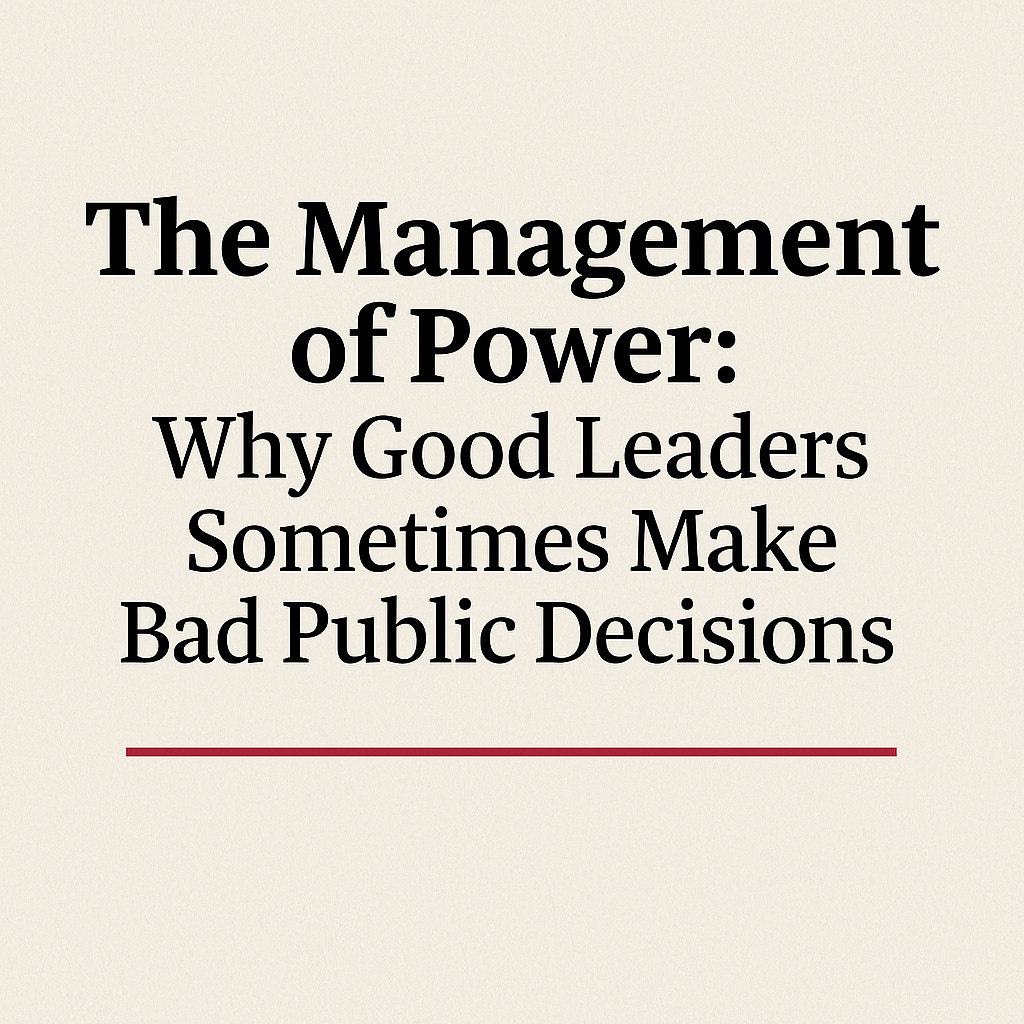The Management of Power: Why Good Leaders Sometimes Make Bad Public Decisions
Series Introduction
When I think about power, I do not see it as something to be claimed or feared. I see it as something to be managed. Over the next three issues of Public Agenda, I will explore what I call The Power Paradox, the point where leadership, management, and human behavior converge to shape the ethics of public service.
This series is not about politics. It is about people: how capable professionals with good intentions sometimes make decisions that weaken trust or harm the very communities they hope to serve. I want us to face those moments with honesty.
I write this not as a critic, but as a strategist and coach who has watched how power changes people and how reflection changes power. Together, we will explore three questions:
Why do good leaders sometimes make poor decisions?
How do systems and structures influence those choices?
How can we reclaim power as a tool for service rather than self-protection?
This begins Part I: The Management of Power.
The Management of Power: Why Good Leaders Sometimes Make Bad Public Decisions
In management and public administration, power is both necessary and risky. It allows leaders to act, allocate, and enforce. Yet history shows that even principled leaders can make choices that contradict their values.
Herbert Simon (1946) described decision-making as “bounded rationality.” Our judgments are limited by information, time, and emotion. Inside bureaucratic systems, those limits are magnified by hierarchy, procedure, and politics.
The Drift Between Values and Behavior
Ethical drift rarely begins with corruption. It begins with small assumptions that slowly distance behavior from belief. Douglas McGregor (1960) proposed that managers view people through one of two lenses: Theory X, which assumes workers need control, and Theory Y, which assumes they seek purpose. When leaders adopt a Theory X mindset, they may justify fear-based management in the name of efficiency. Over time, distrust becomes routine and erodes the moral clarity of leadership.
Daniel Kahneman (2011) explained that humans think in two modes: one fast and intuitive, the other slow and deliberate. Under stress, leaders default to intuition, often choosing loyalty or comfort over truth. In government settings, where compliance and speed are rewarded, these quick judgments can quietly become standard practice.
Tummers and Bekkers (2014) found that administrative behavior is shaped not only by policy but by emotion, stress, and perceived fairness. When leaders feel undervalued, they rationalize self-protective behavior. This “moral licensing” allows them to excuse questionable actions because they see themselves as fundamentally good.
When Culture Reinforces Blindness
Organizational culture can strengthen or weaken these patterns. A culture that prizes results over dialogue will reward outcomes even when the methods violate ethics. A board that values political image over reflection will silence dissent.
Robert Merton (1940) called this “goal displacement,” when following rules replaces pursuing purpose. In such environments, power becomes performance, leadership becomes image management, and ethics becomes secondary.
Coaching as Corrective Practice
Coaching restores reflection. It is not therapy or training. It is guided conversation that links a leader’s actions to their beliefs and reveals assumptions that shape behavior.
Through structured dialogue, leaders begin to recognize patterns: whose approval they seek, what fears control their choices, and how their culture defines success. This is the essence of self-leadership. The International Coaching Federation teaches that coaching builds awareness, accountability, and alignment between values and actions.
Applied to management, coaching helps leaders pause the impulsive “fast thinking” that Kahneman described and engage in deliberate reflection. The simple question becomes, Am I leading for results or for trust?
A Lesson from the Field
During a leadership seminar I facilitated for mid-level managers, one participant admitted that she had supported a policy she personally opposed because she “did not want to be the only one questioning it.” Months later the policy drew criticism for unintended harm. In coaching, her reflection was honest: “I was protecting my position, not my principles.”
That moment defines the management of power. Authority grants influence, but reflection protects integrity.
Reclaiming the Practice of Ethical Management
Ethical management requires three disciplines:
Administrative Literacy: Understand how systems, incentives, and rules influence behavior.
Behavioral Awareness: Recognize bias, emotion, and cognitive shortcuts that distort judgment.
Reflective Practice: Engage in coaching or mentoring that translates awareness into accountability.
When these three disciplines align, power becomes stewardship rather than control.
Closing Reflection and Poll Invitation
Power grows healthier when citizens participate. If you have not taken the Public Agenda poll, it remains open below. Your input helps illuminate how people view accountability and leadership in practice.
Author’s Note
Dr. Shellie M. Bowman, Sr., MBRM, CIPP/US, ACC, is a Public Administration Strategist, certified leadership coach, and founder of eLEADt Coaching & Consulting LLC. This article begins the three-part series “The Power Paradox: Leadership, Management, and the Public Mind.”
Forthcoming installments:
Part II – Systems of Power: How Structures Shape Leadership and Obedience
Part III – The Power to Serve: Reclaiming Ethical Management for Public Value
References
Kahneman, D. (2011). Thinking, fast and slow. Farrar, Straus and Giroux.
McGregor, D. (1960). The human side of enterprise. McGraw-Hill.
Merton, R. K. (1940). Bureaucratic structure and personality. Social Forces, 18(4), 560–568. https://doi.org/10.2307/2570634
Simon, H. A. (1946). The proverbs of administration. Public Administration Review, 6(1), 53–67. https://doi.org/10.2307/973030
Tummers, L., & Bekkers, V. (2014). Policy implementation, street-level bureaucracy, and the importance of discretion. Public Management Review, 16(4), 527–547. https://doi.org/10.1080/14719037.2013.841978
“Democracy isn’t self-cleaning, it responds to the voices that show up.”



